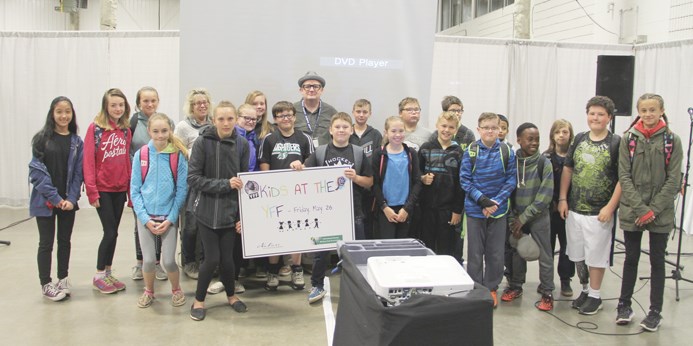Before the film Fix and Release won Best of Festival at this year’s Golden Sheaf Awards, it was being shown to children from local elementary schools. The Kids at the YFF program brought kids to see films, meet people behind them, and take a chance to see a bit of nature after the showing with a nature walk at the Ravine Ecological Reserve.
Scott Dobson directed Fix and Release, and he was there to talk to the kids about the film and its subjects – injured turtles and the people who nurse them back to health. Dobson relished the opportunity to screen the film to kids.
“It’s a great opportunity to show your work in front of young people, and see what they make of it... They have a different way of looking at the world. You get used to showing films to adult audience, and you forget there is a whole other audience out there which is really impressionable and eager, has questions and a different take on things.”
The goal with Fix and Release was to make a nature documentary that was “a little more impressionistic,” spending more time on mood and less time on statistics, hopefully inspiring people to get more interested in turtles and do research of their own after viewing it.
“It’s interesting, you have turtles in this province, but you could tell a lot of people in the audience in this room had never seen a turtle, even though there are turtles in this province. Maybe some of these students will go online and find out more about turtles now, and care about them.”
One of the goals is to spark curiosity in general, and Dobson hopes that the kids who watched the film become more curious about the world.
“Part of it is taking kids places they haven’t been yet. Maybe a film like this will encourage them to travel, to seek new things out. One thing that a lot of people don’t notice about the film is that all of the people who work at this centre are female. That’s not a deliberate thing, that’s just the way it worked out, so the film has a strong message about women in science, and that’s a really good thing for young girls to see, and for young boys. For a long time science has been the domain for men, there is a little bit of that in there too, without preaching and without saying anything, showing science is an option for females.”
The stars of the show are the turtles, and Dobson wants people to come out of the film with a greater appreciation for the animals.
“I wanted to show turtles in an almost product placement kind of way, so people could see what they look like, and see how beautiful they are, a cross between dinosaurs and samurai.”
A thread through the film how much of the work healing the turtles involves a healthy dose of MacGuyver-style improvisation - zip ties feature heavily in shell repair, for example, and most of the supplies used can be found in a typical hardware store. Dobson says that this style of treatment is the result of years of experience.
“For a long time, there has been this debate about the best way to triage and treat injured turtles. They have gone down the path of high tech surgery, lasers and scopes and all of that. They have found that it’s actually the low-tech stuff works the best, because they’ve realized that the turtles themselves have a really amazing ability to heal themselves. What they need is a safe, stable place to be. Stabilize them, stop the injury and make them safe, and really they can do the rest.”
Dobson made the film because of his appreciation for their work, and admits he hopes that he can inspire people to donate to help heal more turtles.
“I did the film because I love what they do. When you experience what they do it fills you with a lot of hope and joy that an individual can make a difference.”
Coming to the Yorkton Film Festival is a bit of a dream come true for Dobson, as he was inspired to become a filmmaker thanks to an article on the festival published in a magazine in 1977, exactly 40 years ago.
“I didn’t even know what a film festival was, and it got me thinking about making films. That fall, with two friends, I went into grade nine in high school and started the filmmaking club. We got some money from student council and made Super-8 films and entered them in this festival. We never got nominated for anything, we never won anything, but it, directly, we something that got me into the filmmaking and documentary business. That was 40 years ago, right now.”
His personal connection to the festival is only one of the reasons that Dobson likes attending YFF.
“The great thing about coming to the Yorkton festival is that unlike a lot of festivals, Yorkton is smaller, more personal, on a more one-on-one scale. There’s less hype and advertising, it’s more about filmmaking. Yorkton retains a lot of the characteristics of what festivals originally were, before they became a big business, so it’s a real pleasure. It’s also really pretty here too.”




